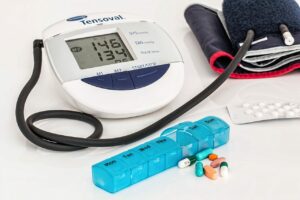High blood pressure, or hypertension, is a common health condition that can increase the risk of heart disease, stroke and other serious health issues. Fortunately, there are several lifestyle changes and strategies that you can adopt to help reduce and manage your blood pressure.
It is important to note that these recommendations should be followed in consultation with your healthcare provider. Here’s a comprehensive guide on how to reduce your blood pressure.
How To Keep Your Blood Pressure Down
Maintain a Healthy Diet
- Reduce Sodium Intake: Limit your consumption of high-sodium foods, such as processed foods, fast food and salty snacks.
- Increase Potassium Intake: Consume potassium-rich foods like bananas, oranges, spinach, and sweet potatoes, as potassium helps balance sodium levels.
- Embrace the DASH Diet: The Dietary Approaches to Stop Hypertension (DASH) diet focuses on fruits, vegetables, whole grains, lean proteins, and low-fat dairy products.
- Limit Saturated and Trans Fats: Choose heart-healthy fats like olive oil, avocados and nuts, while minimizing saturated and trans fats found in fried and processed foods.
Maintain a Healthy Weight
Achieving and maintaining a healthy weight can help lower blood pressure. Regular exercise and a balanced diet are key components of weight management.
Aim for at least 150 minutes of moderate-intensity aerobic activity or 75 minutes of vigorous-intensity activity per week. Exercise helps strengthen the heart and improve blood circulation.
Limit Alcohol Consumption
If you choose to drink alcohol, do so in moderation. This typically means up to one drink per day for women and up to two drinks per day for men.
Quit Smoking
Smoking damages blood vessels and raises blood pressure. Quitting smoking not only improves your blood pressure but also overall health.
Manage Stress
Chronic stress can contribute to high blood pressure. Engage in stress-reduction techniques like deep breathing, meditation, yoga or spending time in nature.
You could also consider getting professional support. Strategies include Cognitive Behavioural Therapy which can teach individuals beneficial coping mechanisms and skills to help manage stress.
Monitor Your Blood Pressure
Regularly check your blood pressure at home using a home blood pressure monitor. This can help you track your progress and alert you to any changes.
Limit Caffeine Intake
While moderate caffeine consumption is generally safe, excessive caffeine intake can temporarily raise blood pressure. Monitor how caffeine affects your body and adjust accordingly.
Get Enough Sleep
Aim for 7 to 9 hours of quality sleep each night. Poor sleep can contribute to elevated blood pressure and other health issues.
Reduce Meat Intake, Processed and Sugary Foods
Minimize your consumption of processed foods, sugary snacks and sugary beverages. These can contribute to weight gain and higher blood pressure. As well as this, limit your intake of red meats and processed meats, which can contribute to elevated blood pressure and other health issues.
Stay Hydrated
Drink plenty of water throughout the day. Staying hydrated supports healthy blood circulation and helps maintain optimal blood pressure levels.
Moderate Your Portion Sizes
Be mindful of portion sizes to avoid overeating. Eating smaller, balanced meals can help prevent spikes in blood pressure after meals.
Include Fiber-Rich Foods
Incorporate high-fiber foods like whole grains, legumes, fruits, and vegetables into your diet. Fiber promotes heart health and can help lower blood pressure.
Limit Added Sugar
Minimize your consumption of added sugars found in sugary drinks, sweets, and processed foods. High sugar intake can contribute to weight gain and hypertension.
Consider Herbal Supplements
Some herbal supplements, such as garlic, hibiscus, and beetroot, have been studied for their potential to help lower blood pressure. Consult your doctor before taking any supplements.
Medication Adherence
If prescribed medication to manage blood pressure, take it as directed by your healthcare provider. Regularly follow up with your doctor to ensure the medication is effective.
Stay Informed
Keep up with the latest guidelines and recommendations for blood pressure management. Regularly consult your healthcare provider for personalized advice.
Stay Hydrated
Drink plenty of water throughout the day. Staying hydrated supports healthy blood circulation and helps maintain optimal blood pressure levels.
Regular Medical Check-Ups
Schedule regular check-ups with your healthcare provider to monitor your blood pressure and overall health. They can provide guidance and adjustments based on your progress.
Final Thoughts
Remember that individual responses to lifestyle changes can vary, so it is important to work closely with your healthcare provider to develop a personalized plan to reduce your blood pressure. Adopting a combination of these strategies and maintaining a healthy lifestyle can greatly contribute to managing and reducing your blood pressure levels, ultimately leading to better heart health and overall well-being.


